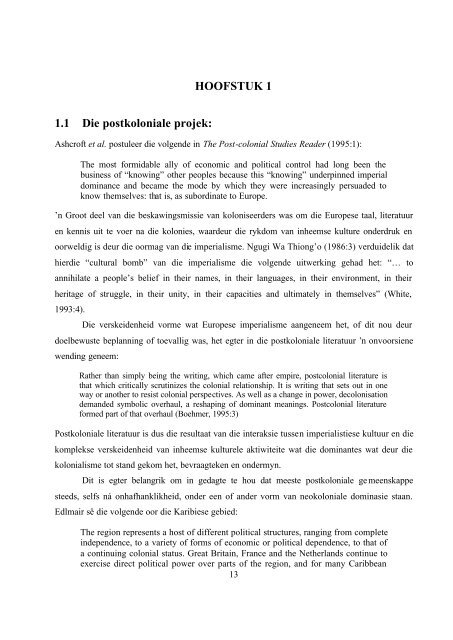POTGIETER-MA-TR02-81.pdf
POTGIETER-MA-TR02-81.pdf
POTGIETER-MA-TR02-81.pdf
You also want an ePaper? Increase the reach of your titles
YUMPU automatically turns print PDFs into web optimized ePapers that Google loves.
1.1 Die postkoloniale projek:<br />
HOOFSTUK 1<br />
Ashcroft et al. postuleer die volgende in The Post-colonial Studies Reader (1995:1):<br />
The most formidable ally of economic and political control had long been the<br />
business of “knowing” other peoples because this “knowing” underpinned imperial<br />
dominance and became the mode by which they were increasingly persuaded to<br />
know themselves: that is, as subordinate to Europe.<br />
’n Groot deel van die beskawingsmissie van koloniseerders was om die Europese taal, literatuur<br />
en kennis uit te voer na die kolonies, waardeur die rykdom van inheemse kulture onderdruk en<br />
oorweldig is deur die oormag van die imperialisme. Ngugi Wa Thiong’o (1986:3) verduidelik dat<br />
hierdie “cultural bomb” van die imperialisme die volgende uitwerking gehad het: “… to<br />
annihilate a people’s belief in their names, in their languages, in their environment, in their<br />
heritage of struggle, in their unity, in their capacities and ultimately in themselves” (White,<br />
1993:4).<br />
Die verskeidenheid vorme wat Europese imperialisme aangeneem het, of dit nou deur<br />
doelbewuste beplanning of toevallig was, het egter in die postkoloniale literatuur ’n onvoorsiene<br />
wending geneem:<br />
Rather than simply being the writing, which came after empire, postcolonial literature is<br />
that which critically scrutinizes the colonial relationship. It is writing that sets out in one<br />
way or another to resist colonial perspectives. As well as a change in power, decolonisation<br />
demanded symbolic overhaul, a reshaping of dominant meanings. Postcolonial literature<br />
formed part of that overhaul (Boehmer, 1995:3)<br />
Postkoloniale literatuur is dus die resultaat van die interaksie tussen imperialistiese kultuur en die<br />
komplekse verskeidenheid van inheemse kulturele aktiwiteite wat die dominantes wat deur die<br />
kolonialisme tot stand gekom het, bevraagteken en ondermyn.<br />
Dit is egter belangrik om in gedagte te hou dat meeste postkoloniale gemeenskappe<br />
steeds, selfs ná onhafhanklikheid, onder een of ander vorm van neokoloniale dominasie staan.<br />
Edlmair sê die volgende oor die Karibiese gebied:<br />
The region represents a host of different political structures, ranging from complete<br />
independence, to a variety of forms of economic or political dependence, to that of<br />
a continuing colonial status. Great Britain, France and the Netherlands continue to<br />
exercise direct political power over parts of the region, and for many Caribbean<br />
13

















